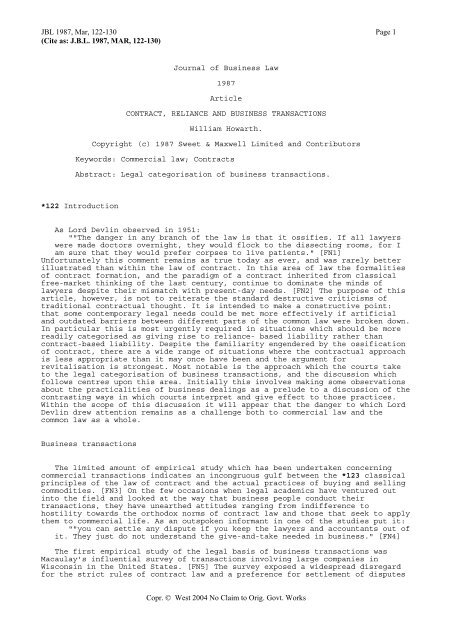Tesco v Constain - Thomson Reuters
Tesco v Constain - Thomson Reuters
Tesco v Constain - Thomson Reuters
Create successful ePaper yourself
Turn your PDF publications into a flip-book with our unique Google optimized e-Paper software.
JBL 1987, Mar, 122-130 Page 1(Cite as: J.B.L. 1987, MAR, 122-130)Journal of Business Law1987ArticleCONTRACT, RELIANCE AND BUSINESS TRANSACTIONSWilliam Howarth.Copyright (c) 1987 Sweet & Maxwell Limited and ContributorsKeywords: Commercial law; ContractsAbstract: Legal categorisation of business transactions.*122 IntroductionAs Lord Devlin observed in 1951:""The danger in any branch of the law is that it ossifies. If all lawyerswere made doctors overnight, they would flock to the dissecting rooms, for Iam sure that they would prefer corpses to live patients." [FN1]Unfortunately this comment remains as true today as ever, and was rarely betterillustrated than within the law of contract. In this area of law the formalitiesof contract formation, and the paradigm of a contract inherited from classicalfree-market thinking of the last century, continue to dominate the minds oflawyers despite their mismatch with present-day needs. [FN2] The purpose of thisarticle, however, is not to reiterate the standard destructive criticisms oftraditional contractual thought. It is intended to make a constructive point:that some contemporary legal needs could be met more effectively if artificialand outdated barriers between different parts of the common law were broken down.In particular this is most urgently required in situations which should be morereadily categorised as giving rise to reliance- based liability rather thancontract-based liability. Despite the familiarity engendered by the ossificationof contract, there are a wide range of situations where the contractual approachis less appropriate than it may once have been and the argument forrevitalisation is strongest. Most notable is the approach which the courts taketo the legal categorisation of business transactions, and the discussion whichfollows centres upon this area. Initially this involves making some observationsabout the practicalities of business dealings as a prelude to a discussion of thecontrasting ways in which courts interpret and give effect to those practices.Within the scope of this discussion it will appear that the danger to which LordDevlin drew attention remains as a challenge both to commercial law and thecommon law as a whole.Business transactionsThe limited amount of empirical study which has been undertaken concerningcommercial transactions indicates an incongruous gulf between the *123 classicalprinciples of the law of contract and the actual practices of buying and sellingcommodities. [FN3] On the few occasions when legal academics have ventured outinto the field and looked at the way that business people conduct theirtransactions, they have unearthed attitudes ranging from indifference tohostility towards the orthodox norms of contract law and those that seek to applythem to commercial life. As an outspoken informant in one of the studies put it:""you can settle any dispute if you keep the lawyers and accountants out ofit. They just do not understand the give-and-take needed in business." [FN4]The first empirical study of the legal basis of business transactions wasMacaulay's influential survey of transactions involving large companies inWisconsin in the United States. [FN5] The survey exposed a widespread disregardfor the strict rules of contract law and a preference for settlement of disputesCopr. © West 2004 No Claim to Orig. Govt. Works
















